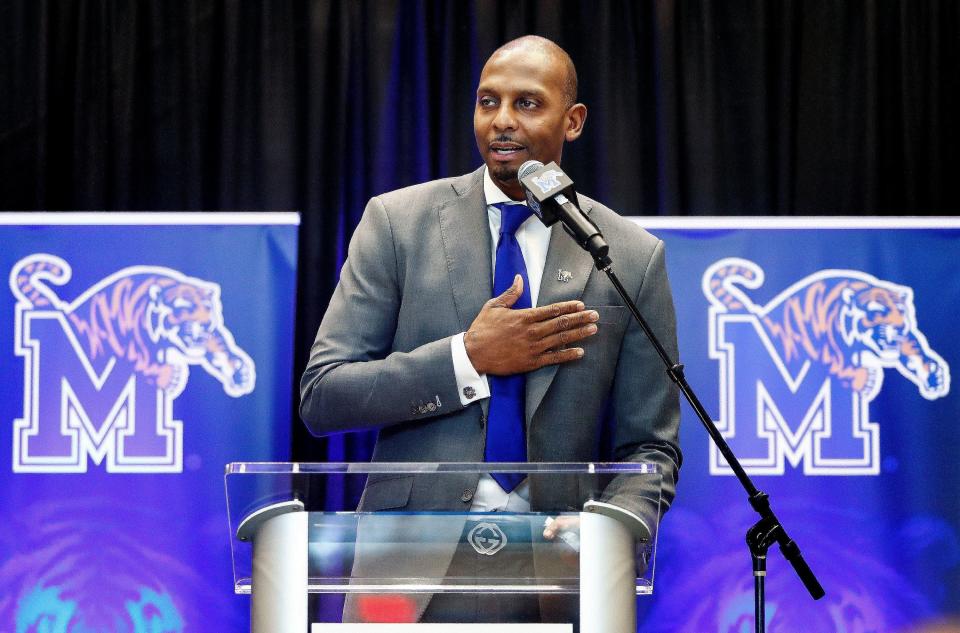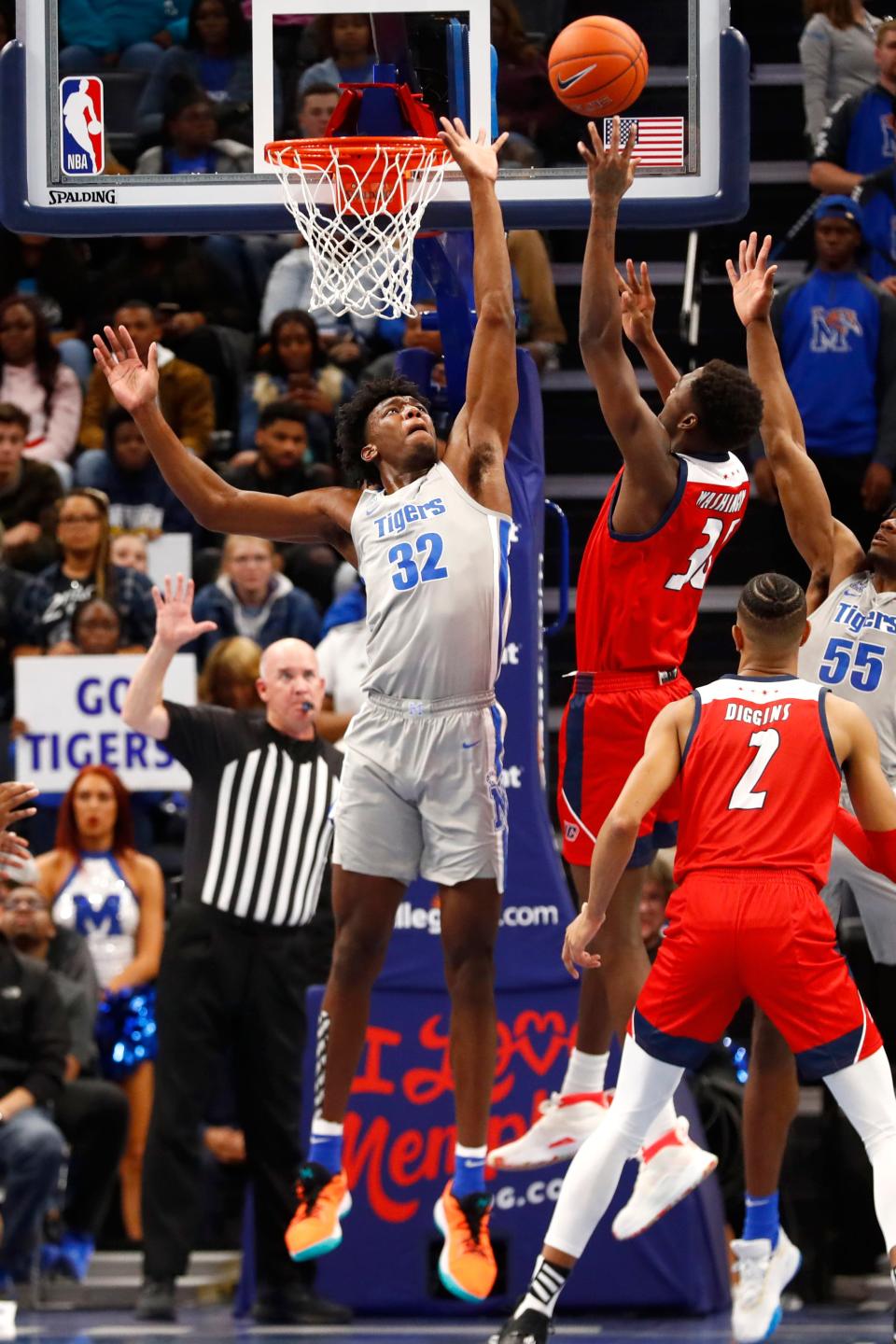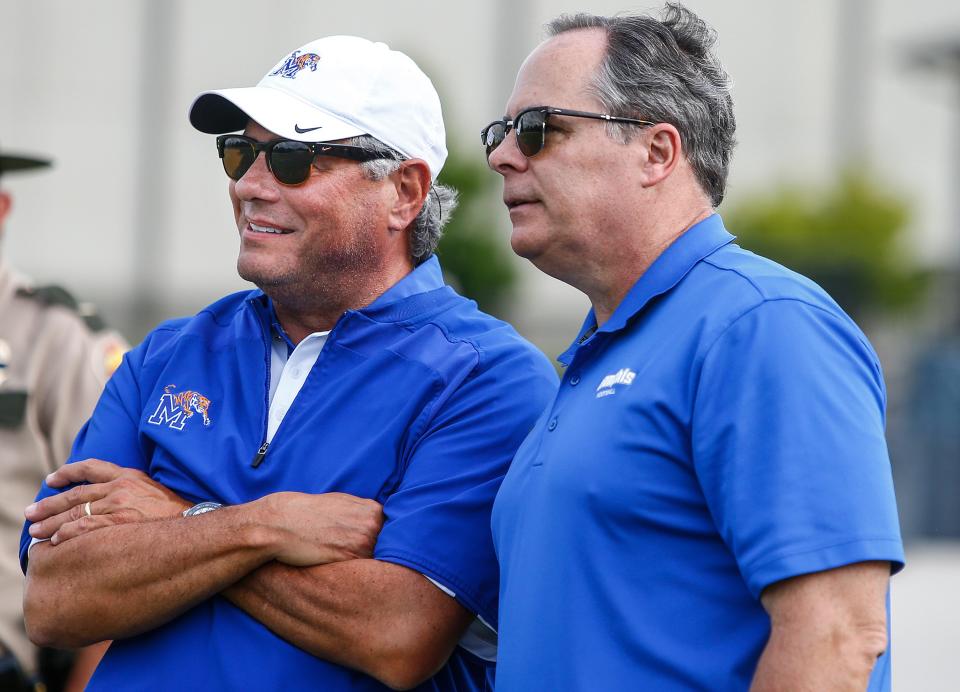What we know about Memphis basketball's NCAA infractions case and a timeline on how we got here
- Oops!Something went wrong.Please try again later.
- Oops!Something went wrong.Please try again later.
The University of Memphis remains embroiled in an NCAA investigation still working its way through the Independent Accountability Resolution Process.
Details of the case against the men's basketball program and coach Penny Hardaway have been kept under wraps since it was formally launched in November 2019. However, documents obtained by The Commercial Appeal through an open records request – while heavily redacted – make it abundantly clear the severity of the charges against Hardaway and Memphis, as well as the university's staunch opposition.
Memphis is facing at least four Level I and two Level II violations, according to an amended Notice Of Allegations, including lack of institutional control, failure to monitor and head coach responsibility. The violations are reported to have occurred between May 2019 and February 2021. Level I and Level II violations are considered the most serious of the NCAA's four-level violation structure.
Hardaway is charged with involvement in one Level I violation and two Level II violations, the specifics of which are redacted.
Amended notice of allegations sent to Memphis by USA TODAY Network on Scribd
MEMPHIS BASKETBALL, PENNY HARDAWAY: University of Memphis charged with multiple Level I violations as part of NCAA's investigation
A CLOSER LOOK: NCAA violations allegations against Memphis basketball, Penny Hardaway. Here's what they mean.
What was initially a probe into Memphis' handling of former star James Wiseman's eligibility status, records show, quickly morphed into a thorough examination of Hardaway, the basketball program, the school's compliance staff, the entire athletic department and university President M. David Rudd.
Dozens of letters and emails provided to The Commercial Appeal reveal details illustrating the broad scope of the investigation and many of its major players.
Amended notice of allegations sent to Memphis by USA TODAY Network on Scribd
Who is in charge of the IARP investigation?
When Memphis' case was referred to the IARP, the Independent Accountability Oversight Committee identified who would make up the Independent Resolution Panel and the Complex Case Unit.
Hugh Fraser was named chief panel member, arbitrator and mediator for the IRP, while Christina Guerola Sarchio (attorney and litigator), Corey Jackson (chief human resources officer, senior vice president and associate chancellor at non-NCAA institution), Michelle Pujals (owner and principal of a legal and sports consulting firm), Dana Welch (private practice arbitrator) and Bruce Meyerson (hearing panel alternate) made up the rest of the group.
Kroll, a corporate investigations and risk consulting firm, was designated to run the investigation for the CCU. Krieg DeVault was named as the independent external advocate. The CCU is made up of Nicole Lamb-Hale (Kroll, external investigator), Marc Quigley (Krieg DeVault, external advocate) and Todd Shumaker (the NCAA's associate director of enforcement).
Memphis' NCAA case: How we got here
2017
Summer: Wiseman played for Hardaway and Team Penny, a Nike Elite Youth Basketball League team on the AAU circuit.
June 9-July 28: Hardaway "provided approximately $11,500 in relocation and living expenses" to Wiseman's mother, Donzaleigh Artis.
Aug. 7: Wiseman enrolls and begins his junior year at East High School in Memphis.
2018
March 20: Hardaway is introduced as the basketball coach at Memphis.

Sept. 10: "Recruitment staff from the University of Memphis made their first face to face contact" with Wiseman.
Nov. 20: Wiseman announces his commitment to Memphis and later signs with the Tigers.
2019
Jan. 25-May 17: "The NCAA and the University of Memphis conducted a thorough cooperative assessment and review" for Wiseman's amateurism certification, according to a lawsuit filed Nov. 8 against the NCAA, on Wiseman’s behalf, seeking a temporary emergency restraining order that would allow him to continue playing. "All information regarding Mr. Hardaway's financial assistance to Ms. Artis and other points of inquiry were shared with the NCAA prior to certification of Mr. Wiseman's eligibility."
May 22: Wiseman graduates from East.
May 29: The NCAA releases Wiseman's final amateurism certification. Subsequently, the NCAA sends Memphis a Notice of Inquiry stating Wiseman's certification was in error, “but representing to the university that the NCAA would honor (its) previous eligibility decision.”
July 16: The NCAA conducts an interview with Hardaway.
Oct. 23: The NCAA conducts its second interview with Hardaway.
Oct. 31: Memphis receives an interpretation of bylaws from the NCAA "purporting to state that certain recruiting violations had taken place in or around the summer of 2017."
Nov. 5: The NCAA informs Memphis it had deemed Wiseman ineligible "based on alleged recruiting violations." On the same day, Wiseman makes his debut for the Tigers and scores 28 points to go along with 11 rebounds.

Nov. 8: A lawsuit is filed on behalf of Wiseman against the NCAA seeking a temporary emergency restraining order that would allow him to play a game that night against Illinois-Chicago. Shelby County Chancery Court granted the order, and Wiseman scored 17 points in a win over UIC.
Nov. 14: Wiseman and his legal team file a notice of voluntary nonsuit in a show of good faith toward the NCAA just days before a hearing in Shelby County Chancery court was scheduled (Nov. 18).
Nov. 20: The NCAA orders Wiseman to sit out the next 11 games and stipulates that he must pay $11,500 to a charity of his choice. Memphis announces it will appeal the suspension.
Nov. 22: Jonathan Duncan, the NCAA’s vice president of enforcement, emails Grace Calhoun, chair of the Infractions Referral Committee, to request the case be referred to the IARP.
Nov. 27: The NCAA upholds Wiseman's suspension, meaning he is ineligible until Jan. 12, 2020.
Dec. 19: Rather than continue to sit out, Wiseman withdraws from Memphis to begin preparing for the NBA Draft.
2020
Jan. 15: Ogletree, Deakins, Nash, Smoak & Stewart, P.C., the University of Memphis’ legal representation in this case, sends a letter to Calhoun supporting the NCAA’s IARP referral request, though for different reasons. “The University does not agree with some assertions made in the NCAA’s letter. That does not compel the conclusion that the University acted inappropriately or in bad faith, engaged in adversarial posturing, or refused to cooperate.”
March 4: After meeting via teleconference on Jan. 31, the Infractions Referral Committee finalizes its decision to send Memphis’ case to the IARP.
July 17-Oct. 15: A series of deadline extensions are approved and case management plan amendments are made as investigators and university officials agree the COVID-19 pandemic has had a significant effect on the proceedings.
Sept. 2: The CCU conducts an with former assistant coach Mike Miller, the first as part of the independent process.
Sept. 29: The CCU conducts an interview with Courtney Vinson, former associate athletic director for Sport Services and senior woman administrator, regarding compliance and institutional control.
Oct. 5: The CCU conducts an interview with former assistant athletic director for compliance Kristan Kelly. The CCU later interviews athletic director Laird Veatch.
Oct. 9: The CCU re-interviews Kelly.
Oct. 12: The CCU conducts an interview with former assistant coach Tony Madlock and, later, former assistant coach Cody Toppert.
Oct. 13: The CCU conducts an interview with former men's basketball head coach Tubby Smith regarding compliance and institutional control.
Oct. 14: The CCU reinterviews Kelly.
Oct. 16: The CCU conducts an interview with former assistant coach Sam Mitchell.
Oct. 19: The CCU emails the university to “request additional documents (redacted) and arrange further interviews with” six employees, including football coach Ryan Silverfield, the football program’s director of recruiting Landan Salem, former assistant coach John Simon and deputy athletic director Jeff Crane.
Oct. 21: The CCU conducts an interview with Hardaway.
Oct. 22: The CCU conducts an interview with Marlon Dechausay, senior associate athletic director for student-athlete welfare, regarding compliance and institutional control.
GIANNOTTO: Welcome to the ridiculous NCAA witch hunt Memphis asked for
Nov. 5: The CCU conducts an interview with former athletic director Tom Bowen.
Nov. 18: Wiseman is drafted No. 2 overall by the Golden State Warriors.
Dec. 3: The CCU conducts an interview with Stephanie Beasley, Rudd's chief of staff, regarding compliance and institutional control.
Dec. 9: The CCU conducts an interview with Rudd.
Dec. 17: Rudd, in a letter to the IRP written soon after he was interviewed by CCU members, raises “a serious concern about the health and well-being of our student-athletes and about their treatment in the IARP.” Rudd concludes his three-page letter by requesting “an adjustment that is consistent with the principles and bylaws cited above and prioritizes dignity, respect, and well-being or at least does not subordinate them to harsh and potentially traumatizing practices that are antithetical to a collaborative process.”

Dec. 22: Lamb-Hale and Quigley co-author a two-page letter refuting Rudd’s claims. “Contrary to your assertions, the CCU has acted in a professional, courteous, and objective manner throughout its investigation,” the letter reads in part. “The CCU's courteous and professional approach in your interview is consistent with its approach in all other interviews.” Lamb-Hale and Quigley encourage Rudd to provide specific examples about his concerns.
Dec. 30: Rudd issues a six-page letter in response to the CCU’s suggestion. In it, he outlines numerous instances that speak to his contention that the CCU’s virtual interviews were more akin to interrogation strategies “rather than genuine interviewing.”
University of Memphis' Response to NCAA's amended NOA by USA TODAY Network on Scribd
2021
Jan. 6: The CCU conducts an interview with Crane regarding alleged failure to cooperate.
Jan. 7: The CCU conducts an interview with Simon regarding alleged failure to cooperate and assist in an investigation.
Jan. 15: The CCU conducts an interview with former Memphis men's basketball graduate assistant Derek Malloy.
Jan. 25: The CCU conducts another interview with Hardaway
Feb. 1: In a letter from Lamb-Hale and Quigley to Fraser, chief panel member of the Independent Resolutions Panel, they allege Memphis has been uncooperative at certain points during the investigation. “… (I)t does not appear to the CCU that the Institution has fully complied with the CCU’s prior requests.”
Feb. 19: Quigley, on behalf of the CCU, notifies Fraser that it has concluded its investigation, but that the CCU was still in the process of “reviewing and analyzing (Memphis’) January 31, 2021 production of approximately 48,000 documents as well as a supplemental production from (Memphis) on February 18, 2021, which were in response to requests originally issued in August of 2020.”
March 28: The Tigers win the National Invitation Tournament championship by beating Mississippi State.
April 19: Memphis receives the initial NOA.
June 2: The university’s legal representation files a response to the NOA, raising concerns with “a wide range of matters regarding the Notice of Allegations, the investigation, accessibility and admissibility of information, and other procedural issues.”
July 6: The university’s legal representation issues a 13-page letter requesting the case be dismissed, outlining its concerns regarding the level of participation by CCU member and the NCAA’s associate director of enforcement Todd Shumaker throughout the investigation.
July 9: Memphis receives the amended NOA – which levies seven separate violations (at least four Level I and at least two Level II) against the university and Hardaway – including lack of institutional control, failure to monitor, failure to cooperate in an investigation, and head coach responsibility.
July 14: The CCU responds to Memphis’ letter regarding Shumaker’s involvement, stating Memphis’ assertions are “overly simplistic and misleading, and there is no justification for the extreme remedy the Institution seeks.”
Aug. 10: The IRP denies Memphis’ request to have its case dismissed.
Aug. 27: Memphis requests that the IRP reconsider its request to have its case dismissed.
Aug. 31: The CCU formally objects to Memphis’ request for reconsideration.
Sept. 3: The IRP denies Memphis’ request for reconsideration.
Oct. 25: After its request for an extension to the 50-page limit is denied, Memphis issues its 50-page response to the amended NOA. In it, the university flatly denies the CCU’s charges or argues none of them merit a Level I violation designation. “UM has presented facts that show institutional control, ongoing and appropriate monitoring, cooperation, a culture of compliance, and head coach responsibility,” the school wrote.
Reach sports writer Jason Munz at jason.munz@commercialappeal.com or on Twitter @munzly.
This article originally appeared on Memphis Commercial Appeal: Memphis basketball NCAA infractions case: What we know, how we got here

